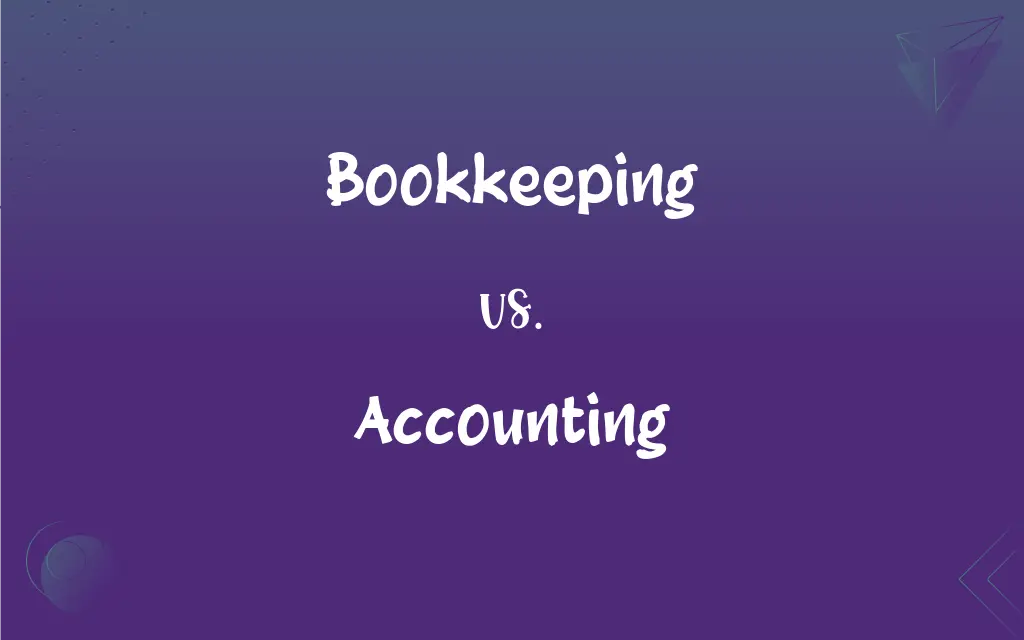Bookkeeping vs. Accounting: What's the Difference?
Edited by Janet White || By Harlon Moss || Updated on October 25, 2023
Bookkeeping involves recording daily financial transactions, while accounting is the interpretation, analysis, and reporting of financial data.

Key Differences
Bookkeeping is the systematic process of recording daily financial transactions in a consistent manner. It's the groundwork upon which the entire accounting system is built. Accounting, in contrast, encompasses a broader range of responsibilities, including the interpretation, analysis, and summarization of financial data into useful reports.
Bookkeeping primarily focuses on the accurate and timely documentation of every financial transaction, be it sales, purchases, expenses, or any other monetary operation. Accounting, on the other hand, uses the data from bookkeeping to prepare financial statements, analyze cash flow, and provide insights for business decision-making.
In many ways, bookkeeping can be seen as the foundational step for accounting. Without diligent bookkeeping, accounting would lack the fundamental data it needs. Conversely, accounting gives purpose and context to the meticulous nature of bookkeeping by turning raw data into meaningful information.
It's also worth noting that with advancements in technology, bookkeeping has largely been automated. However, the analytical and interpretative aspects of accounting still largely depend on human expertise. So, while bookkeeping ensures data integrity, accounting provides a lens to view and understand the financial health of an organization.
Comparison Chart
Purpose
Recording daily financial transactions.
Interpretation, analysis, and reporting of financial data.
ADVERTISEMENT
Scope
Limited to data entry and maintenance.
Broader, includes analysis and decision-making.
Tools Used
Ledgers, journals, and accounting software for entry.
Financial statements, ratios, and advanced software for analysis.
Requires Certification
Not always; depends on the complexity.
Often requires formal education or certification (e.g., CPA).
End Result
Organized financial data ready for analysis.
Financial reports, tax filings, and business insights.
Bookkeeping and Accounting Definitions
Bookkeeping
The systematic recording of financial transactions.
Proper bookkeeping ensures transparency in business finances.
ADVERTISEMENT
Accounting
Preparation and examination of financial statements.
Accounting ensures that stakeholders receive timely financial reports.
Bookkeeping
Daily documentation of financial operations.
Bookkeeping helps track every dollar that enters or leaves a business.
Accounting
The analysis, interpretation, and reporting of financial data.
Accounting helps businesses understand their financial position.
Bookkeeping
Maintenance of financial records in ledgers or software.
Modern bookkeeping often uses software to automate data entry.
Accounting
A broader field encompassing bookkeeping data.
Through accounting, bookkeeping data is transformed into financial statements.
Bookkeeping
The foundational process for accounting.
Without accurate bookkeeping, the accounting process can be flawed.
Accounting
Involves strategic financial decision-making.
Accounting insights often guide a company's financial strategies.
Bookkeeping
Ensuring data integrity for accounting analysis.
Bookkeeping provides the raw data essential for accounting evaluations.
Accounting
A discipline often requiring formal education or certification.
Many companies prefer hiring CPAs for their accounting needs.
Bookkeeping
The practice or profession of recording the accounts and transactions of a business.
Accounting
The practice or profession of maintaining the financial records of a business, including bookkeeping as well as the preparation of statements concerning the assets, liabilities, and operating results.
FAQs
Why is bookkeeping important?
It ensures accurate financial records, helps in tracking income and expenses, aids in financial reporting, and assists in tax preparation.
Who typically performs bookkeeping?
Bookkeepers or accounting clerks are typically responsible for bookkeeping tasks.
What are the main types of bookkeeping systems?
The two main types are single-entry and double-entry bookkeeping systems.
How do accounting and bookkeeping relate?
Bookkeeping is the initial step in the accounting process, focusing on recording transactions. Accounting takes these records to prepare financial reports and offer insights.
What is bookkeeping?
Bookkeeping is the process of recording all financial transactions of a business in an organized manner.
How often should financial statements be prepared?
Financial statements are typically prepared monthly, quarterly, and annually.
Can I do bookkeeping for my small business myself?
Yes, many small business owners handle their own bookkeeping, though hiring a professional can ensure accuracy and save time.
Is an accounting degree necessary to be an accountant?
While you can perform some accounting tasks without a degree, most professional roles require at least a bachelor's degree in accounting or a related field.
How often should bookkeeping be done?
It depends on the business size and volume of transactions. Some businesses might do it daily, others weekly or monthly.
Does bookkeeping require any specific qualifications?
Not necessarily, but having a background in finance or a related field can be beneficial. Some professionals also pursue bookkeeping certifications.
Why is accounting important?
It helps businesses understand their financial health, ensures compliance with tax and regulatory requirements, and guides business decision-making.
What's the difference between a CPA and an accountant?
While all CPAs are accountants, not all accountants are CPAs. CPAs have met specific educational and experience requirements and have passed the CPA exam.
What tools are used in accounting?
Accountants use various software such as SAP, Oracle, and specialized tools like TurboTax for tax accounting.
Can accounting help in business strategy?
Absolutely. Management accounting, in particular, provides insights into business performance, helping in strategic planning and decision-making.
Is bookkeeping the same as accounting?
No, bookkeeping is a subset of accounting. While bookkeeping focuses on recording transactions, accounting is broader and includes interpreting, classifying, analyzing, and reporting financial information.
What is accounting?
Accounting is the process of interpreting, classifying, analyzing, and reporting financial information to provide insights and aid decision-making.
What are the main branches of accounting?
They include financial accounting, management accounting, tax accounting, forensic accounting, and others.
Who typically performs accounting tasks?
Accountants and CPAs (Certified Public Accountants) perform accounting tasks.
What tools are used for bookkeeping?
Tools range from manual ledgers to sophisticated software like QuickBooks, Xero, and others.
Is bookkeeping mandatory for businesses?
Yes, maintaining accurate financial records is generally a legal requirement for businesses.
About Author
Written by
Harlon MossHarlon is a seasoned quality moderator and accomplished content writer for Difference Wiki. An alumnus of the prestigious University of California, he earned his degree in Computer Science. Leveraging his academic background, Harlon brings a meticulous and informed perspective to his work, ensuring content accuracy and excellence.
Edited by
Janet WhiteJanet White has been an esteemed writer and blogger for Difference Wiki. Holding a Master's degree in Science and Medical Journalism from the prestigious Boston University, she has consistently demonstrated her expertise and passion for her field. When she's not immersed in her work, Janet relishes her time exercising, delving into a good book, and cherishing moments with friends and family.































































